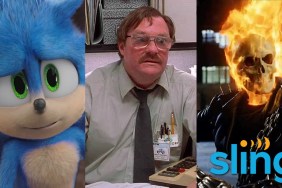Abigail Breslin as Olive
Greg Kinnear as Richard
Paul Dano as Dwayne
Alan Arkin as Grandpa
Toni Collette as Sheryl
Steve Carell as Frank
Jill Talley as Cindy
Gordon Thomson as Larry Sugarman
Justin Shilton as Josh
Bryan Cranston as Stan Grossman
Lauren Shiohama as Miss California
Beth Grant as Pageant Official Jenkins
Dean Norris as State Trooper McCleary
Directed by Jonathan Dayton and Valerie Faris
Summary:
A rare example of stars aligning to create the perfect mix of humor and drama, “Little Miss Sunshine” sets a new standard for the tried-and-true dysfunctional family road comedy.
Story:
When 7-year-old Olive Hoover (Abigail Breslin) learns she’s a finalist in the Little Miss Sunshine pageant, the entire dysfunctional Hoover family piles into a VW bus and drives West to California to get her there in time. Along for the ride are her rebellious teen brother Dwayne (Paul Dano) who has declared a vow of silence, her heroin-snorting Grandpa (Alan Arkin) and her uncle Frank (Steve Carell), who recently attempted suicide after losing his gay lover.
Analysis:
When a movie comes along as refreshing and original in its execution as this one, it’s hard not to shower it with adulation, but who would think that a family road comedy–a genre that has spawned everything from “National Lampoon’s Vacation” to the more recent “RV”–could be that kind of movie?
“Little Miss Sunshine” is not “RV,” and really, the only thing it has in common with “Vacation” is that it involves a cross-country family road trip and it is very, very funny. That humor has to break through the built-in drama surrounding a family that is literally falling apart, even before 7-year-old Olive (Abigail Breslin) learns she was picked as a finalist in a California beauty pageant. Olive’s mother (Toni Collette) has just brought her brother Frank (Steve Carell) home from the hospital where he was placed for trying to commit suicide after being dumped by a male student he was in love with, and Olive’s older brother Dwayne (Paul Dano) has taken a vow of silence until his parents allow him to go to flight school. Her grandfather (Alan Arkin) was recently kicked out of his retirement home for snorting heroin and other unbecoming behavior. With all that going on, the entire family piles into an old VW bus to travel across country to get Olive to the pageant, because her mother refuses to leave any of them behind.
Despite the serious nature of some of the subplots, “Little Miss Sunshine” is most assuredly a comedy, but it’s not so much dark as subdued, due to the way it finds its humor in some of the most unlikely aspects of life and death, loneliness, rejection and wanting to feel like you belong. Its genius lies in the way it deconstructs family dynamics and relationships, making all the characters as flawed as we are in real life, the one exception being Olive, a true innocent who rallies this broken family together and gives them reason to set aside their own needs and expectations to help fulfill her dream.
Working from a solid script from Michael Arndt, first time feature directors Jonathan Dayton and Valerie Faris–you may remember them from their MTV award-winning Smashing Pumpkins video–found the perfect actors to pull off these characters in a way that grounds the movie despite some of the more outlandish situations.
Greg Kinnear’s paternal figure, a motivational speaker living with the knowledge that his program is a failure, is a logical extension of his previous roles and the closest thing to a ‘bad guy’ in the piece. Although Richard constantly preaches belief in one’s self, he doesn’t give his daughter the proper moral support she desperately needs, remarking on her chubbiness as a fault if she wants to compete and making her watch as the rest of the family eats her ice cream in a restaurant. Collette’s clingy love for her family is almost the antithesis, which makes you wonder how these two people might have ended up together, let alone raised a family.
Young Abigail Breslin is a real delight, playing the type of excitable kid that can get on your nerves real fast, but does it in a way that’s sweet and likeable, while Dwayne isn’t much of a departure from Paul Dano’s normal disassociated teen. He does prove he’s up to the challenge of playing a character that is silent for most of the film before a pivotal moment just before Act 3.
At this point, it’s hard for Steve Carell not to steal a scene or even a whole movie with his presence, but he takes a different approach with Uncle Frank, a far more somber character who earns your pity with his tragic story. Avoiding the normal movie stereotypes associated with gay characters, Carell is far more restrained with his humor, allowing Alan Arkin to come in and steal a bunch of laughs with his foul-mouthed diatribes.
The situational comedy inherent in these oddball characters traveling cross-country together is funny enough, but it’s that yellow VW bus carrying them that is often the movie’s true scene-stealer. It breaks down almost as soon as they hit the road, forcing the entire family to push it to get it started again, with all of them running after it to get in. It’s a great visual gag that never gets tired, but by the time the horn starts blaring on its own, you can’t help but laugh at every random bleep.
The Hoovers face even more obstacles once they finally arrive at the pageant, since Olive’s father and brother realize that she’s out of her depth, trying to convince her not to go on, but there are still more than a few unexpected surprises that solidify the bond.
The Bottom Line:
Dayton, Faris and their talented cast bring just the right amount of fresh quirkiness to the overused family road comedy movie to give “Little Miss Sunshine” the type of universal feel that only a filmmaker like Alexander Payne has been able to pull off in the past. Getting solid laughs from everyday situations, the movie mainly works because you fall in love with each and every member of this family and find yourself rooting for them every step of the way.










